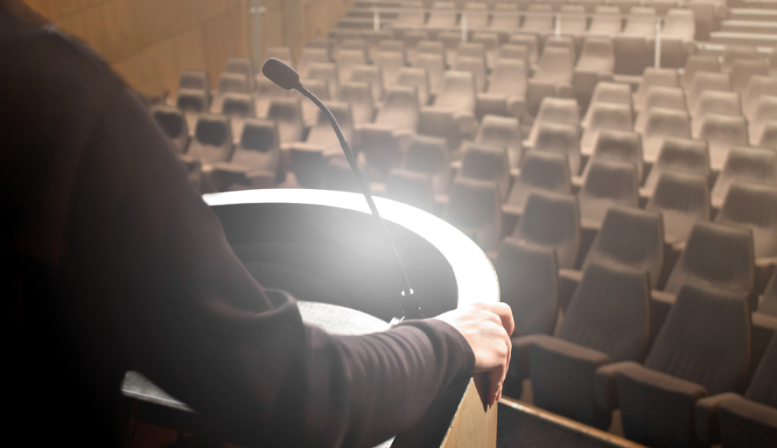11 Little-Known Factors That Could Affect Your Public Speaking

If you’ve spent any amount of time speaking in public, you’ll know that there are a whole range of factors that come into play and can affect your performance. A particularly dramatic example is if you have a hangover because it goes without saying that if you do, you’re not going to be at your best.
In today’s article, we’re going to be taking a look at just eleven of these factors that can affect your public speaking. But we’re not going to be tackling the obvious stuff, like how much time you’ve spent practicing your presentation. Instead, we’re going to look at eleven little-known factors that could affect your public speaking. Let’s get started.

1. Imposter Syndrome
Imposter syndrome is what we experience when we hear a little voice in our head telling us that we don’t deserve the success that we’re experiencing. Most of us suffer from imposter syndrome at some point or other, and what really matters is how we respond to it. When it comes to public speaking, the best thing we can do is to try to bury the imposter syndrome and keep doing what we do best. But that’s often easier said than done.
2. Unfamiliar Content
Okay, so when we said that we weren’t going to tackle how much time you’ve spent practicing your presentation, we weren’t telling you the whole story. Specifically though, we want to talk about unfamiliar content. Not having had enough practice is one thing, but not taking a look at it at all is something else entirely. You’d be surprised how often people do this, either by recycling old presentations or by getting someone else to create the presentation for them.
3. Improvisation
Improvisation can work well in some circumstances, while in others, it can derail your train of thought and weaken your messaging. It can also depend upon whether improvisation is a skill that you’re particularly good at. It’s important to know yourself and decide in advance whether you want to leave yourself enough wiggle room to improvise, or whether you want to set a script and stick to it. Either way, it’s definitely a factor that can affect your performance.
4. Sleep Quality
It’s not unusual for public speakers to have to travel before they deliver their presentations, and this typically means sleeping in an unfamiliar hotel room. The room itself, along with factors like how comfortable the mattress is and how noisy your hotel neighbors are, can have a huge impact on your performance once it’s time for you to take to the stage.
5. Audience Receptiveness
This one’s fairly self-explanatory, really. If you’re delivering a presentation to a hostile audience, it stands to reason that you’re going to find it harder to win them over. The opposite is also true – if everyone wants you to succeed, you’re much more likely to do so. Try to prepare beforehand by doing a little audience research so that you know to whom you’re talking and whether they’re likely to respond well to your message.
6. Tech Issues
Tech issues are a common and constant fear, and so it’s best to just assume that you’re going to run into problems. To prepare for such issues, ensure that you have redundancy in the form of your presentation being stored in multiple locations, both in the cloud and offline in your laptop and on a flash stick or memory card. It can be worth printing out a copy of your slides too so that if all else fails, you can present from that.
7. Time Crunches
We’ve all been guilty of putting off working on a presentation because we’ve known that we’ve got plenty of time to get it done. The problem is that before we know it, we’re facing a time crunch and we’re struggling to finish. Time crunches can happen on the day of the speech, too. For example, we might be ready to talk for 45 minutes and find that we’ve had our slot narrowed down to half an hour. When that happens, we need to adapt.
8. The Event
The event itself can introduce a huge number of variables. For example, if it’s a high-end event that’s aimed at the executives of Fortune 500 companies, it’s going to have a totally different feel to a conference aimed at the fans of a popular TV show. You need to do your research in advance to make sure that you know all about the event and what the vibe is going to be like once you get there.
9. The Acoustics
It’s hard to deliver a talk if no one can hear you, which is why the acoustics of a venue can make such a difference. If you can, check out the venue in advance so that you can get a feel for what the sound is like. True, there’s not a whole amount that you can do about the acoustics, but at least if you know it’s going to be hard for people to hear you, you can plan to talk slower or project your voice a little more.
10. Audience Nationalities
If your audience contains people of various nationalities, they might not all speak English as their first language. When that’s the case, you’ll want to avoid using slang or colloquialisms because they might not be able to understand them. As a general rule, it’s usually best to keep things simple and to assume that you’ll be speaking to people who aren’t native speakers.
11. The Climate
When we talk about the climate of the venue, we’re talking about everything from how hot or cold it is to how much moisture is in the air. Even climate-controlled venues have different settings, and there’s nothing worse than wrapping up warm because you expect it to be cold and then find out that it’s actually warm and dry, or vice versa.
Conclusion
Now that you know our picks for eleven little-known factors that could affect your public speaking, we want to hear from you. Have you ever been affected by the factors on our list? And do you think we’re missing something we should have included?
As always, be sure to let us know in the comments so that we can keep the discussion going, and don’t forget to follow us on your favorite social networking sites for more. We’ll see you soon for another article!





